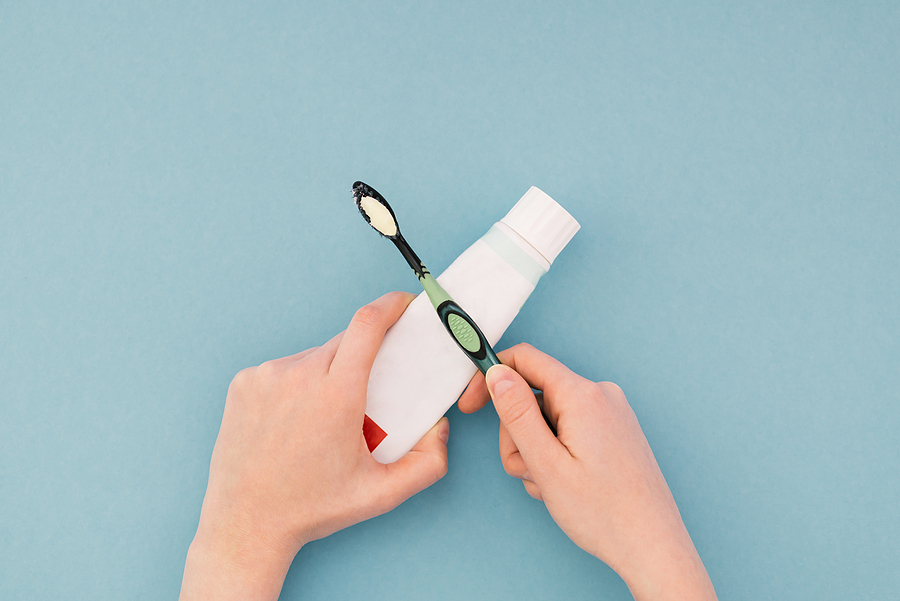Have you ever considered the possibility that chemicals in your environment might be making you sick? So many people I talk to have symptoms they can’t explain, but have no idea that these could be a result of substances in the air around them, the food they eat, the products they choose. But all of these things can be toxic thyroid functioning — so much so that I often call them “thyroid toxins.”
I had a patient, Leslie, who came to me because her hair had broken off all around her head. She was so embarrassed about the way her hair looked that she had extensions put in. But she knew that wasn’t a long term solution, and she wanted to get to the bottom of the issue. I did a full panel of testing, including checking thyroid hormone levels, and what I discovered was that her thyroid stimulating hormone (TSH) was sky high — and so were levels of Mercury in her blood.
I asked Leslie about her diet, and she told me that she ate tuna fish for lunch every single day. While many people – especially pregnant women – have heard warnings about mercury levels in tuna fish, many have not. And even those who have often dismiss these warnings as “paranoid.” But there’s no doubt in my mind after seeing patients like Leslie that we should pay attention to what mercury – along with other heavy metals and common chemicals – do to our bodies.
Leslie had never heard that tuna fish could create an overload of mercury in her system. Once I told her, she stopped eating it, and that along with some minor detoxification support put her back on the road to good health. After a year, her thyroid was functioning normally and all of her hair had grown back, healthy and strong.
That’s just one example of what thyroid toxins can do to you (this does not happen to everyone, but it is important to know it does happen to some). Other common symptoms of thyroid dysfunction include tremor and nervousness; difficulty concentrating and “fuzzy head”; changes to menstrual cycle; bloating; muscle aches and pains; increased heart rate; sensitivity to heat or cold; and weight gain.
Does this sound like you? If so, it might be time to take a closer look at your thyroid functioning, and which thyroid toxins you may be exposed to regularly.
The Relationship Between Thyroid Disease and Toxins
Thyroid disease is running rampant in the US. According to the American Thyroid Association (ATA), more than 12 percent of the population will develop some kind of thyroid condition in their lifetime. Thyroid disease touches an estimated 20 million American lives, and up to 60% of those don’t even realize they have a problem.
I see women all the time in my practice who come in, like Leslie, unaware that thyroid problems are even a consideration. But I think that all women should know the risks, because women are far more likely than men to develop thyroid disorders; In fact, the ATA says one in eight women will develop a thyroid condition during her lifetime.
Thyroid diseases are often life-long conditions that can be managed with the proper attention from a health care practitioner. But so often, conventional medical practitioners turn to prescription medications to simply control the symptoms, rather than seeking out the cause of the problem. Part of the reason is that the causes can be so difficult to pinpoint.
In recent years, there’s been a lot of talk about the relationship between toxins and thyroid disease. Most women don’t realize that many of these toxic chemicals are present in products they use every day – which could certainly explain why so many of them are experiencing thyroid problems! It’s time women understand that everything they come into contact with can impact their health — and though they can’t always avoid thyroid toxins (in the air, for instance) there are steps they can take to minimize the impact.
How Can Toxins Ravage My Thyroid?
The thyroid is a butterfly shaped gland located at the base of the front of your neck. Located at the bottom of your throat, this small but mighty gland releases hormones that are part of metabolism regulation and functioning of your endocrine, neurological, cardiovascular and immune systems.
Although your thyroid has many responsibilities, it’s easily damaged by outside forces like environmental toxins, several of which are structurally similar enough to mimic thyroid hormones. Your thyroid also attracts halogens and metals – and while this is good in the case of iodine and selenium, which are used to produce and metabolize thyroid hormones, it’s not so great when harmful halogens and metals build up in the gland. This pile up of thyroid toxins is ultimately responsible for the symptoms you feel. And you can control the amount of toxic build-up if you are aware of your surroundings and making the healthiest choices possible.
Thyroid Toxins: Common Toxins and Their Impact on Thyroid Health
I don’t think it’s any coincidence that thyroid disease is on the rise as our water, earth and food becomes more polluted. We are exposed to so many more chemicals than our ancestors were – and develop more disease accordingly. The types of thyroid toxins we encounter regularly fall into four broad categories: pesticides, industrial chemicals, toxins in consumer products, and heavy metals. Let’s break down these categories a bit more and discuss the impact these have on thyroid functioning and development of thyroid disease.
Pesticides
Pesticides and herbicides are used so widely in industrial farming that they are extremely hard to avoid unless you are eating 100% organically. And they are well documented thyroid toxins. Exposure to pesticides has been associated with hypothyroidism in both men and women. Pesticides and herbicides make it difficult for the thyroid to intake iodine. They also interfere with thyroid hormone gene expression, bind to thyroid hormone transport proteins, decrease uptake of thyroid hormone by cells, and cause more thyroid hormone to be expelled from the body. The more pesticides you ingest on a regular basis, the higher risk you have for developing problems with your thyroid.
Industrial Chemicals
Three common industrial pollutants have been found to disrupt thyroid functioning significantly: Perchlorate, polychlorinated biphenyls (PCBs), and dioxin. These man-made chemicals (in some environments, perchlorate is found naturally in small amounts) contaminate the soil, water and air, and accumulate in our food and water sources.
Perchlorate
Perchlorate is a chemical used in military applications – like rocket fuel – and the production of leather, paint, batteries and rubber. Both high and low doses of perchlorate have been found to disrupt thyroid function. Perchlorate competes to be taken in by the thyroid gland with iodine, which is a necessary part of T4. That’s because it contains chlorine, which has the same ionic charge as iodine. When perchlorate replaces iodine, reduced thyroid hormone production can result.
PCBs
You may already have heard about PCBs, which were banned in the US in 1979. But did you know that although they’ve not been used for several decades, they’re still present in the environment, and impacting the thyroid? PCBs were used in electrical equipment, and the production of plastics, adhesives, and paints. PCBs decrease production of thyroid hormone receptor, which leaves thyroid hormone with no place to go. PCBs also limit circulating T4 by binding to thyroid transport proteins, disrupt liver enzymes from converting T4 to T3, raise thyroid antibody levels and can cause an enlarged thyroid gland. Chlorine is present in PCBs, and there is great similarity between the structure of PCBs and thyroid hormone, all of which likely contribute to the effects of PCBs on the thyroid. The disruption of thyroid hormone caused by PCBs has been shown to alter fetal brain development as well.
Dioxin
Dioxin is another chemical resulting from manufacturing processes. It mimics thyroid hormone structure, and has been associated with a decrease in T4 and diminished thyroid function even at standard exposure levels, particularly in women. The decrease in T4 seems to occur when dioxin binds to cell receptors that intensify a process called glucuronidation, which helps in the excretion of hormones.
Because these chemicals were or are used so widely, there’s not much you can do to avoid them. But still, it’s essential to be aware of the impact these potential thyroid toxins can have. If you are experiencing symptoms of less than optimal thyroid functioning, you can then take steps to support your body as it naturally detoxifies.
Toxins in Consumer Products
Maybe you’ve never thought carefully about the products you are bringing into your home, but you should. So many products these days are replete with chemicals, and some of these can have a devastating effect on the thyroid. Let’s take a look at a few of the most significant thyroid toxins that many people are exposed to daily.
Flame Retardants
While reducing flammability of carpeting, furniture and clothing might seem like a good idea, it’s important to know what makes these items repel flames can also make them harmful. Current data suggests that flame retardant chemicals have a significant impact on thyroid dysregulation. They contain bromine, which is a halogen. Flame retardants mimic the structure of the thyroid hormone, prevent T4 from being transported in blood by taking its place, compete for binding sites with thyroid hormone receptors, and disrupt estrogen activity.
Plastics
It takes a very conscious effort to avoid having plastics in your home. From food storage to toys, and even personal care products, plastics are everywhere. And the chemicals in many plastics, such as BPA and phthalates, masquerade as natural hormones disrupting the entire endocrine system. The lining of food cans and plastic bottles contain BPA, which has been found to change thyroid structure and block T3 thyroid hormone receptors. Phthalates, which are found in adhesives, plastics, vinyl flooring and even your personal care products impede thyroid function by preventing thyroid hormone from binding to its receptors.
Other Household Products
Even washing your hands, cooking, and sitting on a couch can be detrimental to your thyroid. Triclosan, found in antibacterial products, and PFOA, which shows up in non-stick cookware and stain-resistant fabrics are two other toxic chemicals that see everyday use.
Heavy Metals
I’m sure you’ve heard about the dangers of lead, but have you ever considered other heavy metals, which are everywhere in our environment? There’s plenty of research documenting the harmful effects heavy metals can have on health. Those most likely to be thyroid toxins include lead, cadmium, aluminum and mercury.
Lead
Lead has been an environmental contaminant for many years. Although awareness of the dangers of lead has grown significantly, it’s still pervasive in the environment due to industrialization, mining, prior use of lead in paint and gasoline. Cheap metal jewelry and children’s toys also often contain dangerous amounts of lead.
Cadmium
Mining and smelting operations emit cadmium into the environment, and it’s also present in sewage, batteries, plastics, pigments, and phosphate fertilizers. Constant exposure to cadmium has been linked to development of a goiter, as well as reducing thyroglobulin secretion and launching thyroid cell hyperplasia, which could lead to thyroid cancer. Research has shown that occupational exposure to lead is associated with increased levels of TSH and declining thyroid function.
Aluminum and Mercury
Both of these heavy metals have been found to reduce iodine uptake, which in turn blocks production of thyroid hormone. One of the most common sources of mercury is found in our mouths, in dental amalgams. Seafood and coal-burning power plants are two additional common sources of mercury. Aluminum is found in antacids, personal care product – especially deodorant, vaccines, cookware, and food additives.
If Thyroid Toxins Are Everywhere, What Can I Do?
All of this information may seem overwhelming, prompting feelings of hopelessness or despair. But I assure you there are steps you can take to minimize exposure and protect your thyroid health. A little awareness goes a long way! Try these tips to get started.
- Be sure you are getting enough iodine and selenium. These two minerals support the thyroid, reducing the effects of toxins on your thyroid. They work together, so it’s important to pay attention to both.
- Eat organic as often as possible. Avoiding pesticides is beneficial to your thyroid – and your overall health. Eating organic can be prohibitively expensive, so at the very least check in with the Environmental Working Group for their list of the “dirty dozen,” fruits and vegetables found to contain the most pesticides. Buy these organic, even if you have to stick to non-organic for others. If you are growing your own vegetables or tending a large lawn, opt out of using pesticides.
- Filter your water. A simple water pitcher won’t be enough – though it’s better than nothing. To really rid your water of toxins and protect your health, I suggest a reverse-osmosis, whole house filter system to reduce exposure both in drinking water and when you bathe.
- Reduce use of antibacterial products. The societal obsession with killing bacteria can actually make you more susceptible to health problems, including thyroid issues. Washing with natural soaps and water is a better choice.
- Avoid plastics. There are many great options for food storage, water bottles, etc. BPA-free plastics are better than the alternative, but even those contain other potential risks to your thyroid. Glass is a much better choice.
- Don’t cook in chemicals. Non-stick cookware might be convenient for cleaning, but wouldn’t you rather scrub a little more and protect your thyroid health? Choose stainless steel or enameled cast iron instead.
- Detox carefully. I don’t advocate for extreme detox programs, which can actually do more harm than good. Your body is set up to detoxify naturally, especially if your eating and lifestyle habits are supportive, not detrimental. Removing thyroid toxins from your regular routines, and paying close attention to the food you eat are great first steps. You may need additional support, and I recommend working closely with your health care provider to find the best detox protocol for your unique circumstances.
Your Thyroid Will Thank You When You Pay Attention to Toxicity!
No two people are alike, but everyone can benefit from reducing the amount of exposure they get to toxic substances. While one person may not be sensitive to the build up from every day exposure, another may feel the impact immediately. Wherever you fall on that spectrum, reducing the stress you place on your thyroid will help keep you healthy and strong. And if you’re already experiencing clear signs of thyroid dysfunction, it’s essential you begin now. Reducing your toxic burden today can leave you feeling amazing tomorrow — and beyond!
References:
https://kresserinstitute.com/environmental-toxins-harm-thyroid/
https://www.mindbodygreen.com/0-12346/11-everyday-toxins-that-are-harming-your-thyroid.html







